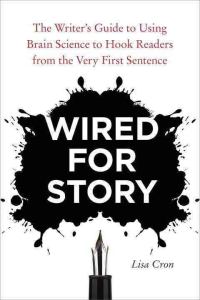 Some years ago I had a friend who didn’t believe recipes had any place in the kitchen. He would start cooking a meat pie, then decide it needed some fruit. Too sweet? Add some paprika. Maybe it’s not a pie after all. Now it’s a desert. Cover it in honey! I’m not joking. My friend valued originality above all. People enjoyed his parties, but never for their cuisine.
Some years ago I had a friend who didn’t believe recipes had any place in the kitchen. He would start cooking a meat pie, then decide it needed some fruit. Too sweet? Add some paprika. Maybe it’s not a pie after all. Now it’s a desert. Cover it in honey! I’m not joking. My friend valued originality above all. People enjoyed his parties, but never for their cuisine.
It’s amazing how many writers try to write this way.
Wired For Story by Lisa Cron is an interesting book. It pulls together a lot of well researched information about the connection between storytelling and neuroscience. And guess what? The latest insights of science are showing us that stories are waaaaaaaaay more important to how humans think than most people realise. Stories aren’t just idle entertainment. Stories are, quite literally, the way we think.
(Writers have suspected this for a long time, and researchers like Brene Brown are proving just how important the scientific study of stories can be.)
How often have you heard people dismiss a story for being formulaic? How often have you done it yourself? But when it comes to storytelling, our cultural obsession with originality does us little or no good. The great formulas of storytelling, like great recipes, exist because our narrative tastebuds respond powerfully to that combination of story flavours. The task for the writer isn’t to toss away the Hero’s Journey , five act structure, or any of the beautiful formulas for great stories from history, but instead like a great cook, you must flavour them slightly differently for the palates of modern audiences.
Wired For Story is a remarkable foundation to build a great understanding of storytelling upon. I can’t recommend it highly enough.

I don’t disagree with your point, but I think you’re misusing the word formulaic. The word you’re looking for is archetypal. The Hero’s Journey is an archetype, not a formula. A formula tells you exactly which steps to take and when to take them. It is possible to inject some originality into the story, but it takes an extraordinarily talented writer. An archetype is like a skeleton, and a disassembled skeleton at that. A formula is practically a story already, but an archetype is not a story until you add your original voice.
LikeLike
Hi Tamara. Sure, I understand the distinction you are making. But truth be told, I think we really use a term like “archetype” just as a high class way of saying recipe or formula! On 30 Nov 2015 12:10 am, “Damien Walter” wrote:
>
LikeLike